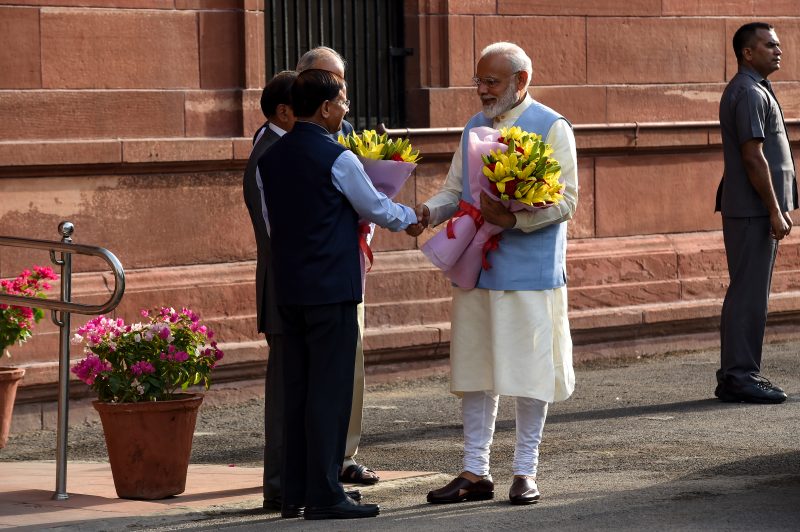New India government suffers double economy hit
Indian Prime Minister Narendra Modi’s Hindu nationalist Bharatiya Janata Party (BJP) won the election on a tough national security stance, barely mentioning the economy (Money SHARMA )
New Delhi (AFP) – Prime Minister Narendra Modi’s new government suffered a double economic blow of slowing growth and rising unemployment as it took office Friday.
Modi named Nirmala Sitharaman as his new finance minister in a drastically revamped Hindu nationalist administration after winning a second straight landslide in the April-May election.
But hours after India’s first full-time woman finance minister took office, the government announced the third straight fall in quarterly growth to 5.8 percent in the first three months of the year.
The figure was down from 6.6 percent in the last quarter of 2018 and was much worse than the 6.3 percent that many analysts had predicted.
It means India has lost its place as the world’s fastest growing major economy to China, which had 6.4 percent growth in the first quarter. And some economists said slower investment growth and weak consumer spending mean India’s performance could be even worse in the next quarter.
In parallel, authorities also said the unemployment rate for 2017-2018 was 6.1 percent, which media said was the worst since 1973.
– Economy pressure –
The jobless figures should have been released before the election. When a newspaper reported the gloomy unemployment report in January, Modi’s government said the statistics were not ready.
Modi’s Hindu nationalist Bharatiya Janata Party (BJP) won the election on a tough national security stance, barely mentioning the economy.
The bad news increases pressure on Sitharaman to kickstart reforms and create jobs for more than 12 million young Indians entering the workforce every year.
The BJP manifesto had promised a $1.4 trillion infrastructure spending spree over five years that it hopes will boost labour prospects.
“The slowdown shows Modi needs to address agricultural distress and focus on boosting economic activity and generating employment,” Ashutosh Datar, a Mumbai-based economist told AFP.
“Sitharaman and Modi will have to decide on finding long-term solutions to economic problems instead of short-term fixes,” Datar added.
Modi was much-criticised for suddenly cancelling a huge proportion of bank notes in 2016, in a bid to hit the black economy.
– Hindu agenda –
The economy has still grown by about seven percent a year since he first took office in 2014 on a pro-business platform but that has not been enough to create desperately needed jobs.
Huge debts in the agriculture sector — still India’s biggest employer — have also hit the economy and been blamed for the suicides of thousands of farmers.
Modi replaced around three cabinet ministers and deputy ministers from the last administration, bringing in many new lawmakers expected to pursue more policies to please the BJP’s Hindu base in the coming five years.
Modi named his trusted aide, Amit Shah, for the key role of home minister, confirming his long-time ally as his number two.
As BJP president, Shah, 54, masterminded Modi’s second election triumph and must now pursue Modi’s nationalist agenda in internal security, immigration and other key national issues.
A controversial figure, Shah was accused of ordering police to carry out three extrajudicial killings in his home state of Gujarat in 2005.
He was arrested in 2010 and banished from the western state for two years before being cleared in 2014 for lack of evidence.
Career diplomat S. Jaishankar became foreign minister. The appointment of the China expert and former ambassador to Washington was seen as a sign that Modi will put more emphasis on diplomacy with the world’s main powers in his second term.
Jaishankar, who was the top foreign ministry official until his retirement last year, was an influential advisor to Modi during his first five years in power.
Jaishankar took the mantle from Sushma Swaraj, a party veteran who underwent a kidney transplant in 2016 and has been beset by poor health.
Modi also set up a new ministry of water power in keeping with his promise to make safe drinking water a priority for his government.
Modi, along with 24 cabinet rank ministers and more than 30 deputy ministers, were sworn in at the presidential palace on Thursday.
Presidents and prime ministers from neighbouring Bangladesh, Sri Lanka, Nepal and the Maldives were present, but arch-rival Pakistan was not among those invited.
Disclaimer: Validity of the above story is for 7 Days from original date of publishing. Source: AFP.


